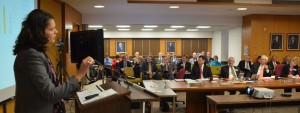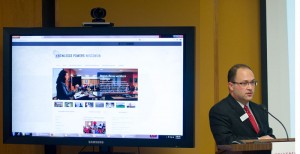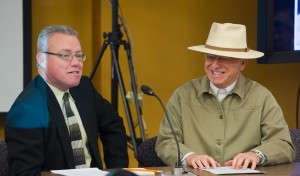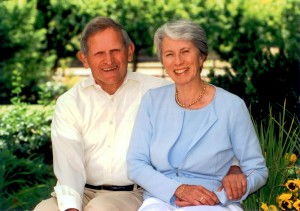MADISON, Wis. – The economic purposes of higher education are both crucial and growing in American society, an expert on higher education and economic development told the University of Wisconsin System Board of Regents on Thursday.
“If higher education institutions don’t provide people with the skills required to get and keep a job, it’s pretty clear that the institutions will fail to serve their other missions to create a democratic culture and to give individuals the opportunity to participate fully in their times well beyond their economic roles,” said Anthony Carnevale, Research Professor and Director of the Georgetown University Center on Education and the Workforce.
Carnevale spoke to the Board as part of an in-depth discussion of the crucial role higher education plays in workforce and economic development and how the university can best meet the needs of Wisconsin students, businesses, residents, and communities.
Higher education took on this new emphasis in the post-recession United States of the early 1980s, Carnevale explained, when rapidly evolving new technologies restructured the American economy. With these changes, entry-level skill requirements for many jobs went up, and employers – who used to do the job of training workers themselves – started asking for higher skills at the entry level. “In the American system … when jobs demanded more of people, we had only one institution to turn to, and that was education,” Carnevale said.
Carnevale said the most striking change has been the stronger link between personal income and area of study – which has shifted the relationship between education and the economy.
That creates problems for educators, he said, because higher education traditionally has also been considered crucial to the preservation of civic culture and the development of engaged citizens.
“If we intend to make people able to be good citizens and live fully in their lifetimes, that competes for budget with educational programs that have direct economic returns. That tension is going to be with us for a long time,” Carnevale said.
About 53 million job openings are projected in the United States between 2010 and 2020, Carnevale said, with 60% of those jobs requiring some post-secondary training. The large number of retiring baby-boomers exacerbates the skills gap.
Carnevale added that the widening differences in American income levels is principally caused by access to jobs that require post-secondary education versus access to jobs that don’t.
Regent David Walsh noted that there is a general recognition that education is important and we need to invest in it, but given the multiple priorities that decision-makers must juggle, he wondered what argument could be made to justify more investment in education.
Carnevale acknowledged the challenge, and said, “You either stick with the purity of your ideals or if you really want to be helpful, you have to ask what would make people better off, given resource restraints.”
Carnevale also suggested that greater transparency would be beneficial, making clear to students the likely economic consequences of their educational decisions. “If you’re at the UW and trying to be an architect, it should tell you in the catalogue what’s likely to happen to you when you graduate,” he said.
Regent Regina Millner raised the question of how to help many first-generation college students make fully informed education decisions, when their parents may come from a time and place where a high school diploma was sufficient. She wondered how to help such students “understand at a younger level that investment in post-high school education is really going to make difference in their lives when it runs counter to their family experience.”
Carnevale acknowledged that given Wisconsin’s historically strong manufacturing base, this is a particular challenge. The dual challenge is drumming up demand for college and also figuring out how to pay for it, he said, and suggested both might be addressed while in high school.
Focusing more on Wisconsin-specific needs, Rebekah Kowalski, a Principal Consultant for Manpower Group’s Right Management practice, spoke to Regents about the projected employment needs included in Competitive Wisconsin’s report, “Be Bold 2: Growing Wisconsin’s Talent Pool.”
“We have a major talent mismatch, and it’s starting to have an economic impact,” she said. Simply put, there are not enough skilled workers, she told Regents, and it is vital that we build sustainable pipelines of talent which in turn drive sustainable wealth and socioeconomic stability.
She noted that only 17% of small companies and 31% of large companies in Wisconsin report that they have world-class, innovation talent. Further, 66% report that they lack the talent to drive global engagement into the next decade.
“We need higher skilled talent and we need it very, very quickly or we’re going to have a real crisis on our hands,” she said.
Kowalski told Regents there needs to be greater attention to what she called “skills clusters,” the multiple skills that can be applied across occupations and industries.
Adapting to the new economic demands requires aligning curriculum requirements with industry insights; managing the tension between employer “needs” and employer “wants”; developing a lifelong learning model (including expanding flexible programming and cost-effective offerings); right-sizing programs based on employment needs; providing reality-based employment counseling; and creating alliances with employers to develop pipelines that start in middle school or high school level.
Several Chancellors addressed the curricular challenges. UW-Milwaukee Chancellor Mike Lovell reminded the Board that 48% of entering students at his institution require remedial math – putting them at significant disadvantage. Citing employers’ continuing call for workers with problem-solving skills, UW-La Crosse Chancellor Joe Gow voiced concern that the “mysterious, softer skills” often captured in liberal arts are undervalued.
- See the
In meeting marketplace demands, UW System President Kevin Reilly noted that UW institutions conferred 34,608 degrees at all levels in 2010-11 – up from about 29,000 a decade earlier. He told Regents that the number of undergraduate degrees in Science, Technology, Engineering and Math (STEM) fields has grown by 46% over the past ten years. In the same period, degrees in health-related fields are up by 39%.
He also noted that new degree programs have been added in high-demand fields, such as the B.S. degree in Supply Chain Management at UW-Stout, the collaborative Health and Wellness Management program offered by UW-La Crosse, UW-River Falls, UW-Stevens Point, UW-Superior and UW-Extension, as well as the B.B.A. degree in Entrepreneurship at UW-Whitewater.
UW System unveils Knowledge Powers Wisconsin strategy
UW System unveiled a new branding strategy – “Knowledge Powers Wisconsin” – designed to highlight the essential role UW System institutions play in powering the state’s economic strength.
- See the
- Visit the website: www.uwpowerswi.com
David Giroux, executive director of UW System’s Communications & External Relations Team, told Regents that while they all see the strong connections between our public universities and the vitality of our state, a much better job might be done in explaining that value to the citizens of this state.
He emphasized that the new UW System communications strategy would not supersede the strong brands of individual institutions. Rather, the intent is to help chancellors, communicators, and others articulate a common message around a key issue: the relationship between a strong UW and a robust state economy.
Giroux also presented the findings of a statewide survey undertaken last March, which indicated that 73% of Wisconsin residents consider higher education important. Access and affordability were considered top priorities for higher education.
The survey also found that stimulating job growth and attracting new industries topped all responses for areas where the UW System can improve, Giroux reported. “That’s where people want to see us moving the needle,” he said.
He showcased several applications of the campaign, tying UW to vital economic drivers in the state, such as agriculture and manufacturing.
“I believe this provides a framework for a new strategic vision for the UW System. This is maybe a new spin on the Growth Agenda, a new way of articulating what we do, one that more accurately reflects all that we do,” Giroux said.
Regent Jerry Whitburn commended the campaign, saying it is “an appropriate message grounded in research.”
Regent Regina Millner said she appreciated that UW System is moving beyond the general concept of higher education to how higher education improves the lives of people in Wisconsin. She added that one of the campaign’s strengths is in its “understanding of how the whole is stronger than individual parts.”
UW-Cooperative Extension celebrates 100th anniversary
In marking its 100th anniversary, UW Cooperative Extension, a division of UW-Extension, called on the dramatic skills of Dean and Director Rick Klemme and Ray Cross, Chancellor of UW Colleges and UW-Extension, to provide an informative and humorous recounting of its century-long history. A costumed Cross played the part of Earnest Leonard Luther, the first-ever educator hired by UW-Extension, while Klemme “interviewed” him.
- See
- See the website: http://100.ces.uwex.edu
The presentation highlighted the many, varied ways in which Cooperative Extension has become an integral part of Wisconsin communities, working with families, farms and individuals, and helping bring about change – in attitudes, behaviors and ways of life.
“Cooperative Extension is a unique partnership of the university, the federal government, county governments, and Wisconsin residents working together to help people put knowledge to work,” said UW System President Reilly, who previously served as Chancellor of UW-Extension.
Regents award presentation
The Regents presented their first-ever Regents’ Award for Distinguished Service to the University of Wisconsin System to UW-Madison alumni John and Tashia Morgridge.
“Their history of commitment and service to higher education in Wisconsin makes them ideal recipients of this award,” said Regent President Brent Smith. “Their contributions impact not only those who attend the UW-Madison, but also those who attend any public two- or four-year higher education institution in Wisconsin.”
- See the Nov. 7 news release
In accepting the award, John Morgridge told Regents they were deeply honored, and thanked them for “permitting us to play in your sandbox.” He said they are also appreciative of the opportunity to spend time visiting UW System institutions, “meeting young people who are smart, energetic, and optimistic, and (who) refresh on a continuous basis our souls.”
The Morgridges’ philanthropic generosity includes their 2007 gift of $175 million to endow the Fund for Wisconsin Scholars, which provides grants for lower-income students graduating from a public high school in the state to attend one of UW System’s two- or four-year colleges or universities, or a Wisconsin Technical College System institution. Smith called the size and nature of the Morgridges’ endowment gift “unprecedented in Wisconsin.”
According to John Morgridge, $25 million has been distributed through the FWS in the past 4 ½ years to about 3,500 students.
“We started with the assumption that money was one of the deterrents to kids graduating,” John Morgridge said. “In four-year institutions, what we’ve seen is better retention, more credits taken, better grade point averages, and more involvement.” He added that another result is that FWS students may need to work fewer hours – allowing them the opportunity to get involved in other activities.
Tashia Morgridge also told the Board about their recent “Wisconsin Technology Initiative” project to provide interactive whiteboards to schools around the state.
Board hears about serving student veterans
In advance of Veterans Day on Nov. 11, the Regents heard a wide-ranging presentation on the needs and challenges of serving student veterans at UW System institutions.
While student veterans still represent a relatively small proportion of total students on UW campuses – less than 3% — they are also a growing segment of the campus population. Since the Wisconsin GI Bill was implemented in 2005, the number of student veterans served by UW institutions has increased by more than 200%, now topping 5,000.
Regent Vice President Michael Falbo, a veteran of the United States Army, Vietnam Medic Corps, said he is happy that today’s returning vets come to college in a very different climate. He noted that there’s more public support for the troops, and more supportive programs for our student veterans.
“It’s still not a perfect system, and it never will be,” Falbo said. “Helping dedicated soldiers become successful students will always be challenging, but we can and should pay close attention to these challenges.”
Mark Nook, Senior Vice President for Academic and Student Affairs, told Regents that veterans are typically older than traditional students and are more likely to be non-white, have transfer credits earned through courses taken while in the military, and have experience living abroad and taking on leadershipship roles. Student veterans also often face unique challenges that other non-traditional students do not encounter.
- See the
Nook pointed out that the growing number of children and spouses of veterans accessing benefits are also a challenge for UW System. Last year, for the first time, those costs exceeded those for veterans.
The Board heard from a panel of three campus Veterans Coordinators: Elaina Koltz, UW-Green Bay; Janice Nordin, UW-Whitewater; and Miranda Cross-Schindler, UW-Eau Claire.
Koltz described some of the challenges for student veterans in making the transition to civilian life, and said, “It is important to bring awareness of these issues to faculty and staff to better serve veterans on campus.”
Nordin stressed the importance of creating dedicated space and resources on campus for veterans. “They need to know they’re not the only ones on campus who have served their country,” she said.
Cross-Schindler told Regents that as many as 40% of vets from Iraq are estimated to have mental health issues of some sort. One-third of those get minimal care, and one-third get none, she said.
Sharing their personal experiences with the Board were three student veterans: Eli Caywood, a graduate of UW-Platteville; Suzan Bayorgeon, a senior at UW-Stevens Point; and Corie Richardson, a freshman at UW-Milwaukee.
“Not many people understand the issues we’re dealing with,” Caywood said.
Richardson commended the on-campus veterans groups which helped him navigate confusing information, and enabled him to “feel more comfortable and not lost and scared like I was.”
In other business, the Regents:
- Approved a resolution supporting changes to the University of Wisconsin Medical Foundation (UWMF) corporate Bylaws; and
- Approved a reporting framework for NCAA Division I athletics programs.
###
The UW System Board of Regents will hold its next meeting December 6-7, 2012, at UW-Madison




